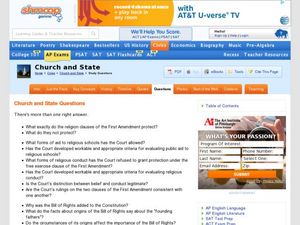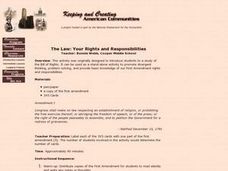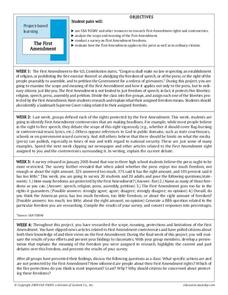Curated OER
Voting and the U.S. Constitution (Past, Present, and Future)
Students discuss the 26th Amendment, then write letters to a future guest speaker. Students listen to the guest speaker and ask them questions about voting and voter turnout. Students then create handbills urging citizens to vote.
Curated OER
Fair Housing Lesson 4: Constitutional Hearing
Students investigate fair housing issues in the United States. In this government lesson, students watch "No Place Like Home," and then prepare to participate in a classroom simulation that requires them to act as state legislators and...
Curated OER
Essentials of the US Constitution
Learners determine how the content of the U.S. Government enables the U.S. Government to function. They examine the roles and functions of the three branches of government and how the separation of powers and checks and balances affect...
Curated OER
Rights Under the Fourth Amendment
Twelfth graders examine the Fourth Amendment and discuss an actual Supreme court case. They determine whether or not the person's rights were violated. they search newspapers for articles where the Fourth Amendment may have been violated
Curated OER
Church and State Questions
In this U. S. government worksheet, learners respond to 17 short answer questions about the first amendment and the separation of church and state.
Curated OER
The Constitution
Eighth graders watch as their teacher presents information on the Constitution, government and laws through a PowerPoint presentation. In groups, they discuss the importance of government and laws and identify the main ideas in the...
Administrative Office of the US Courts
Texas v. Johnson
Which right does the Constitution weigh more heavily: the sanctity of the American flag as a symbol of national unity, or the right to burn the flag in protest? The 1989 Supreme Court case of Texas v. Johnson explores a state's right to...
C-SPAN
Presidential Birth Requirement
Every president of the United States must be a natural-born citizen, but the definition of natural-born is not as straightforward as it seems. Secondary scholars examine two points of view surrounding the constitutional requirement and...
Curated OER
Creating a Bill of Rights
Creating a Bill of Rights isn't easy! Help your scholars experience what the Founding Fathers did by challenging them to write a Bill of Rights. Groups pretend they are a new democratic country and proceed to create that country's Bill...
Curated OER
The Law: Your Rights and Responsibilities
Students explore First Amendment rights and responsibilities.
Curated OER
The First Amendment
Eleventh graders examine the First Amendment. In this US Government lesson, 11th graders analyze the scope and meaning of the first amendment. Students conduct a survey on First Amendment freedoms. Student evaluate the First Amendment.
Curated OER
American Revolution and Constitution Take-Home Assessment
In this early American history worksheet, students draw diagrams of that feature the responsibilities of each of the 3 branches of the federal government and then create their own original visuals that highlight the formation of American...
Curated OER
We the People. . .
Students explore the United States Constitution. In this government lesson, students write newspaper editorials that reflect their opinions about Amendments.
Curated OER
The Constitution and The Bill of Rights
Studnets explore the events and issues surrounding the Constitutional Convenetion and the Bill of Rights through web-sites interacting with such topics as the framers, court cases, games and more.
Curated OER
Bill of Rights and Lawmaking
Ninth graders consider how the Bill of Rights impacts the lawmaking process in the United States. In this Bill of Rights lesson, 9th graders discuss the amendments and their limitations. Students research the role of the Legislative...
Curated OER
Church and State Separation: The Challenge and the Debate
Students describe the basic elements of the U.S. Constitution's First Amendment as it relates to the separation of church and state and freedom of religion.
Curated OER
Individual Rights
Students study the individual rights enshrined in the U.S. Constitution. They determine where these rights come from, and why we value them as we do. They consider that our individual rights are not absolute, and may be limited by other...
Curated OER
Fugitive from Labor Cases: Henry Garnett (1850) and Moses Honner (1860)
Students engage in the comparison of cases which demonstrate the increasingly volatile political crisis in the 1850s arising over the issue of slavery and the necessity for the enactment of the 13th, 14th, and 15th Amendments to the U.S....
Curated OER
Susan B. Anthony and the 19th Amendment
Students take a closer look at the Women's Suffrage Movement in America. In this women's rights lesson, students research suffrage leaders and write papers about them. Students then read and discuss information about Susan B. Anthony's...
Curated OER
First Amendment: Bill of Rights
Twelfth graders explore the First Amendment and the rights that are protected by the First Amendment. They discuss how the First Amendment is important to their daily lives. Students research the amendment and complete a concept map.
Curated OER
The First & Fourteenth Amendments
Students analyze the historical implications of the First Amendment of 1791 and the Fourteenth Amendment of 1868, upon American Indians and African Americans. They consider the applicability of the 14th Amendment to African Americans in...
Curated OER
The Philadelphia Convention/Constitutional Convention
Eleventh graders explore the major points covered during the Philadelphia Convention/Constitutional Convention. They discuss the Federalists and the Anti federalists. They discuss the Bill of Rights and the drafting of the Constitution....
Curated OER
Search and Seizure: What Does It Mean?
Students, in a juvenile correctional facility, study the meaning of the Fourth Constitutional Amendment. They study definitions and complete worksheets to investigate the implications of the amendment.
Curated OER
the Impact of the U.s. Supreme Court on High School Journalism.
Young scholars study of the First Amendment, Tinker, Hazelwood and the Colorado Student Free Expression Law. They discuss the ramifications on the student press and recite their memorized First Amendment rights. They discover what...

























